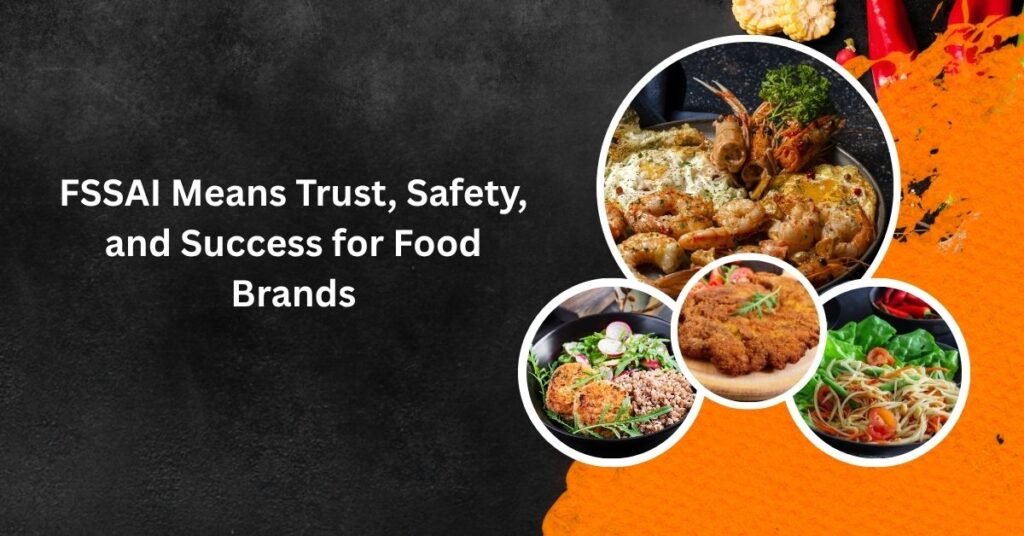If you’re in the food business whether running a restaurant, selling packaged snacks, or launching a cloud kitchen, there’s one name you need to know and trust: FSSAI. Short for Food Safety and Standards Authority of India, FSSAI is not just a license—it’s your brand’s promise of quality, safety, and credibility.
In today’s market, customers are becoming smarter. They don’t just buy food—they buy trust. And that trust starts with an FSSAI license. Let’s explore how FSSAI helps your food brand become safer, more trusted, and more successful.
What Is FSSAI?
FSSAI is a government body under the Ministry of Health and Family Welfare. Its main job is to regulate and monitor food safety in India. It sets the standards for food quality, hygiene, packaging, and labeling. Every food business operator (FBO) in India must follow these rules and register under FSSAI.
You get an FSSAI license or registration number, which must be printed on your food packaging and displayed at your business location.
1. FSSAI Builds Trust with Your Customers
Why Trust Matters
In the food business, trust is everything. If people don’t trust your food, they won’t buy it, no matter how tasty or cheap it is. One food safety issue, and your brand’s reputation could take a major hit.
How FSSAI Creates Trust
Having an FSSAI license signals to your customers that:
- You follow government-approved safety standards.
- Your kitchen or factory maintains hygiene.
- Your ingredients are safe and permitted.
- Your packaging and labeling are honest and clear.
This creates an immediate sense of security and consumer confidence. People are more likely to try your product, recommend it to others, and become repeat buyers—all because you carry that one five-letter proof: FSSAI.
2. FSSAI Ensures Food Safety from Kitchen to Customer
The Power of Food Safety
Food safety isn’t just about cleanliness—it’s about preventing health risks, avoiding contamination, and ensuring long-term quality. It includes everything from raw material sourcing to final delivery.
FSSAI’s Role in Ensuring Safety
FSSAI has strict guidelines and checks in place for:
- Food processing methods
- Use of preservatives and additives
- Storage conditions
- Sanitation standards for food handlers
- Pest control and waste disposal
Following these standards ensures that your food is not just delicious but also safe for consumption. This reduces the risk of food poisoning, illness, and complaints, saving your business from legal trouble and negative publicity.
3. FSSAI Drives Business Growth
Expand Legally and Easily
With an FSSAI license, you can:
- Expand your product range with confidence
- Sell on online platforms like Zomato, Swiggy, Amazon, Flipkart, and more
- Supply to large retail chains and supermarkets
- Export your products, as FSSAI is internationally recognized
Many distributors, online platforms, and big buyers will only work with FSSAI-licensed food businesses. Without this registration, your growth options are limited.
Gain Customer Loyalty
FSSAI is more than just a requirement—it’s a marketing advantage. When customers see the FSSAI logo on your product, they associate it with professionalism and quality. That trust helps build brand loyalty, which is key to long-term growth.
4. FSSAI Helps You Avoid Penalties and Legal Issues
Operating a food business without FSSAI registration can lead to:
- Heavy penalties (up to ₹5 lakh)
- Business shutdowns
- Legal action and court cases
- Loss of customer trust
5. FSSAI Helps You Get Business Loans and Funding
Whether you’re applying for a business loan, seeking investor funding, or participating in government schemes for MSMEs, having an FSSAI license adds credibility. It proves your business is legitimate, regulated, and capable of growth.
Banks and financial institutions see FSSAI registration as a positive sign that your business operates responsibly. It can even improve your chances of getting quick approvals and better loan terms.
6. FSSAI Is Easy and Affordable to Register
Many small food businesses assume that FSSAI registration is complicated or expensive, but that’s not true.
There are three main types of FSSAI licenses:
- Basic Registration (for businesses with turnover below ₹12 lakh/year)
- State License (for turnover between ₹12 lakh and ₹20 crore)
- Central License (for large businesses or those operating in multiple states)
The process is online, and you can usually complete it with minimal documents:
- ID and address proof
- Business details
- Food category and type
- Photos and declaration form
With the help of FSSAI consultants or online service providers, you can complete the registration process in a few days.
Also Read: FSSAI license for Restaurants – Documents and process
Conclusion
In today’s competitive food industry, FSSAI registration is more than just a formality—it’s your key to building trust, ensuring safety, and driving business growth. With FSSAI, you gain a stronger market reputation, increased customer confidence, and better chances of repeat sales. It also protects your business legally from fines and shutdowns. Plus, it opens doors to expansion, partnerships, and funding opportunities both locally and globally. If you haven’t registered yet, now is the time. Take the next step and build your food business on a solid foundation of trust and success.







